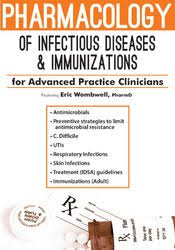Pharmacology of Infectious Diseases & Immunizations for Advanced Practice Clinicians – Eric Wombwell
$200.00 Original price was: $200.00.$56.00Current price is: $56.00.
Proof of item:
Watch this recording and learn proper prescribing, patient education and monitoring procedures for a variety of drug regimens used to treat common acute and chronic infectious diseases. Choosing an antibacterial agent can be challenging, given the plethora of drugs available on the market and the emerging trend in bacterial resistance.
You will learn the pharmacology of different classes of antimicrobials used to treat infectious disease states encountered in clinical practice. Discover the spectrums of activity, pharmacokinetic characteristics and parameters for monitoring therapeutic outcomes. Emphasis is placed on the new antimicrobials and advances in evidence-based treatment guidelines.
You will leave this recording better prepared to design appropriate and cost-effective drug regimens for improved therapeutic outcomes.
- Analyze the major classes of antibiotics and their pharmacokinetic characteristics.
- Apply current evidenced-based approaches to select appropriate treatment regimens for common infections encountered in clinical practice.
- Prescribe antimicrobials based on empiric dosing recommendations.
- Plan goals of therapy and parameters for monitoring therapeutic response to antimicrobials.
- Recommend specific antimicrobial therapeutic drug monitoring to maximize efficacy and minimize toxicities (e.g., vancomycin and aminoglycosides).
- Develop preventative strategies to limit antimicrobial resistance.
- Design patient and caregiver education on the proper use of antimicrobials.
Antimicrobials
- Drug classes
- Pharmacokinetic Properties
- Concentration-dependent killing
- Time-dependent killing
- Post-antibiotic effect
- Common interactions with other drugs
Antibacterial Allergies – Sulfa and Penicillin
- Define true allergy
- Sulfonamide antibiotics vs non-antibiotics
- Penicillin – Cephalosporin cross-sensitivity
Bacteria
- Differentiation
- Normal flora
- Common pathogens
Antibacterial Resistance – Contributing Factors
- Trends
- Mechanisms of resistance
- Contributing factors
Methicillin-Resistant Staphylococcus Aureus – Community versus Hospital Acquired
- Differentiating between CA- and HA-MRSA
- Current clinical practice guidelines
- Pharmacologic management
Enterobacteriaceae Resistance
- Extended Spectrum Beta-Lactamase (ESBL)
- What are ESBLs
- Pharmacologic management
- Carbapenem-Resistant Enterobacteriaceae (CRE)
- What are CREs
- Pharmacologic management
Urinary Tract Infections
- Bacterial Etiology, Signs and Symptoms and Diagnosis
- Cystitis and pyelonephritis
- Complicated and uncomplicated
- UTIs in pregnancy
- Treatment (IDSA Guideline Treatment Algorithm)
- Acute
- Recurrent and relapse
Clostridium Difficile Infection
- Risk factors
- Pharmacology management
- Fecal Transplantation
- Probiotics literature review
Community–Acquired Pneumonia
- Bacterial etiology
- Diagnosis
- Typical vs. atypical
- Treatment (IDSA/ATS Guidelines) and monitoring
- Outpatient vs. inpatient
- Empiric treatment
Healthcare–Associated Pneumonia
- Bacterial etiology
- Treatment (IDSA/ATS Guidelines)
Upper Respiratory Tract Infections
- Sinusitis and pharyngitis
- Etiology (Viral vs. Bacterial)
- Treatment
Skin and Soft Tissue Infections
- Cellulitis
- Bacterial etiology
- Strep. vs. Staph. vs. MRSA
- Signs & symptoms
- Treatment (IDSA Guidelines)
Influenza
- Clinical features
- Diagnosis
- Pharmacology management
Immunizations (Adult)
- Types of Vaccines
- General recommendations
- Contraindications & precautions
Tag: “Pharmacology of Infectious Diseases & Immunizations for Advanced Practice Clinicians – Eric Wombwell” Review. “Pharmacology of Infectious Diseases & Immunizations for Advanced Practice Clinicians – Eric Wombwell” download. “Pharmacology of Infectious Diseases & Immunizations for Advanced Practice Clinicians – Eric Wombwell” discount.
1 review for Pharmacology of Infectious Diseases & Immunizations for Advanced Practice Clinicians – Eric Wombwell
| 5 star | 100 | 100% |
| 4 star | 0% | |
| 3 star | 0% | |
| 2 star | 0% | |
| 1 star | 0% |
Sorry, no reviews match your current selections
Q & A
Related products
Personal Development
Personal Development
Personal Development
Personal Development
Personal Development
Reuben Brooks – The Ultimate Transformation – Meal Plan & Training Program
Personal Development
Personal Development
Cameron Blas – Filming And Editing Mastery With Final Cut Pro X
Personal Development
Jess Lively – Magic Flow School – The Ultimate Course Bundle














A+ seller | Pharmacology of Infectious Diseases & Immunizations for Advanced Practice Clinicians – Eric Wombwell